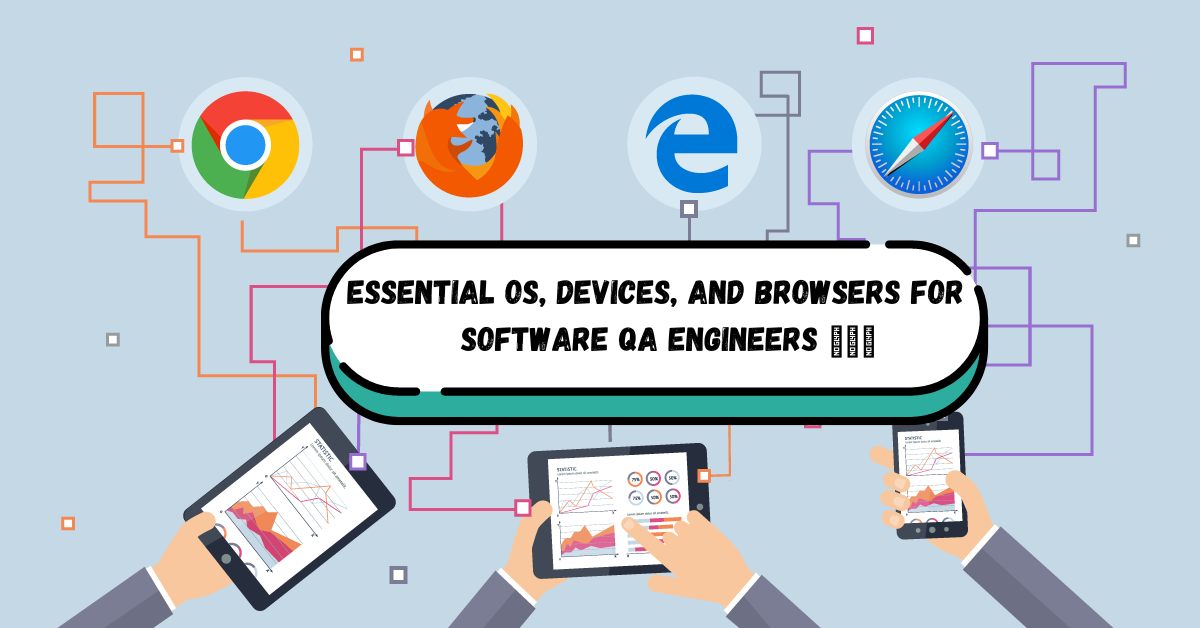Essential OS, Devices, and Browsers for Software QA Testing 💻📱🔍
 Mejbaur Bahar Fagun
Mejbaur Bahar Fagun
Introduction:
As a Software Quality Assurance (QA) engineer, conducting comprehensive testing across diverse platforms is crucial to ensure the reliability, compatibility, and performance of software applications. This article aims to provide insights into the significant types of operating systems (OS), devices, and web browsers that are of paramount importance for software QA engineers when planning their testing approach. Let's delve into the essentials! 🚀
Operating Systems (OS):
Windows 🖥️: Windows OS holds a substantial market share, necessitating thorough testing on different versions such as Windows 10, Windows 11, and possibly older versions like Windows 7 or 8. This ensures software compatibility and a seamless user experience for Windows users.
macOS 🍎: Testing on Apple's macOS is vital, particularly for applications targeting macOS users. It is essential to verify software performance across various macOS versions, such as Mojave, Catalina, Big Sur, and the latest iteration, Monterey.
Linux 🐧: With its extensive usage in server and development environments, Linux testing assumes significance. Consider testing on popular distributions like Ubuntu, Fedora, and CentOS, as they offer distinct configurations and package managers.
Devices:
Desktop Computers 💻: Thoroughly test software on a range of desktop computers with diverse hardware specifications. This practice enables the evaluation of software performance, stability, and responsiveness across varying setups.
Laptops 📱: Include testing on different laptop models and configurations to ensure optimal software functionality across both Windows and macOS environments.
Mobile Devices 📱: As the mobile app market continues to thrive, it is crucial to test applications on popular smartphone platforms like iOS and Android. Cover a broad spectrum of devices, including various screen sizes, operating system versions, and manufacturers, to ensure seamless performance across the mobile landscape.
Tablets 📱: Consider testing on popular tablet devices, such as iPads or Android tablets, to cater to users who prefer these platforms.
Web Browsers:
Google Chrome 🌐: Chrome enjoys significant popularity and widespread usage across multiple operating systems. Perform thorough testing on different versions of Chrome to ensure consistent performance and compatibility.
Mozilla Firefox 🦊: With a considerable user base, Firefox remains a prominent browser choice. Test on multiple versions of Firefox to identify and address any browser-specific issues.
Apple Safari 🍃: Safari is primarily used on macOS and iOS devices, making it crucial for applications targeting Apple users. Ensure comprehensive testing on different Safari versions, including the latest updates.
Additional Testing Devices:
Virtual Machines 💡: Utilize virtualization technologies to set up virtual machines with different operating systems, enabling simultaneous testing on multiple platforms without the need for physical devices.
Smart TVs and Streaming Devices 📺: Test applications on popular smart TV platforms (e.g., Samsung Smart TV, LG webOS) and streaming devices (e.g., Roku, Amazon Fire TV) to ensure seamless user experiences across these devices.
Wearable Devices ⌚: If your software interacts with wearable devices like smartwatches or fitness trackers, conduct testing to verify proper integration and functionality.
IoT Devices 🏠: With the proliferation of the Internet of Things (IoT) devices, it may be necessary to test software compatibility and connectivity on devices like smart home assistants, thermostats, or security cameras.
Conclusion:
For software QA engineers, adopting a comprehensive testing strategy is vital to deliver high-quality software. Thorough testing across diverse operating systems, devices, and web browsers ensures compatibility, reliability, and optimal user experiences. Stay updated with the latest trends and advancements in the software landscape to refine your testing approach and continually improve the quality of software applications. Happy testing! 🧪🔍
🔀 𝐂𝐨𝐧𝐧𝐞𝐜𝐭 𝐖𝐢𝐭𝐡 𝐌𝐞
𝐅𝐚𝐜𝐞𝐛𝐨𝐨𝐤: https://lnkd.in/dQhnGZTy
𝐅𝐚𝐜𝐞𝐛𝐨𝐨𝐤 𝐏𝐚𝐠𝐞: https://lnkd.in/gaSKMG2y
𝐈𝐧𝐬𝐭𝐚𝐠𝐫𝐚𝐦: https://lnkd.in/gid7Ehku
Hashnode: Mejbaur Bahar Fagun
𝐌𝐞𝐝𝐢𝐮𝐦: https://lnkd.in/gP6V2iQz
𝐆𝐢𝐭𝐡𝐮𝐛: https://github.com/fagunti
𝐘𝐨𝐮𝐓𝐮𝐛𝐞: https://lnkd.in/gg9AY4BE
#softwareqa #testingessentials #operatingsystems #devices #webbrowsers #virtualmachines #smarttvtesting #wearabledevices #iottesting #qualityassurance #userexperience #happytesting #QAengineer #softwaretesting #OScompatibility #devicecoverage #browsertesting #WindowsTesting #macOSTesting #LinuxTesting #DesktopComputers #LaptopTesting #MobileDeviceTesting #TabletTesting #ChromeBrowser #FirefoxBrowser #SafariBrowser #VirtualizationTesting #SmartTVTesting #WearableTechTesting #IoTDeviceTesting #SoftwareQuality #TestingStrategy #TechQA #TestCoverage #SeamlessPerformance #UserSatisfaction #QAinsights #TestingTips #SoftwareQualityAssurance #CrossPlatformTesting #DeviceCompatibility #BrowserCompatibility #TestingStrategies #QualityAssuranceEngineer #TestCoverage #PerformanceTesting #UsabilityTesting #BugHunting #TestAutomation #TestingFrameworks #TechTesting #TestersLife #QualityMatters #BugFreeSoftware #TestingCommunity #ContinuousTesting #AgileTesting #SoftwareDevelopment #QualityFirst #TestingMethodology #TestDrivenDevelopment #CodeQuality #qaengineer #qa #qamanual #qatesting #qaengineers #sqa #sqaengineer #mejbaurbaharfagun #MejbaurBaharFagun
Subscribe to my newsletter
Read articles from Mejbaur Bahar Fagun directly inside your inbox. Subscribe to the newsletter, and don't miss out.
Written by

Mejbaur Bahar Fagun
Mejbaur Bahar Fagun
With a strong background in both Software QA Engineering and Certified Ethical Hacking, I bring a unique and comprehensive skill set to my work. My expertise in manual and automated testing, along with my ability to design effective test frameworks from scratch, makes me a valuable asset to any software development team. My familiarity with both the Waterfall and Scrum methodologies of the SDLC ensure that I can operate seamlessly within any development process. I have a proven track record of effectively verifying software products, conducting thorough online form factor validations, and verifying complex algorithm designs through the use of Matlab scripts. Let me bring my technical expertise and commitment to ethical practices to your next project.